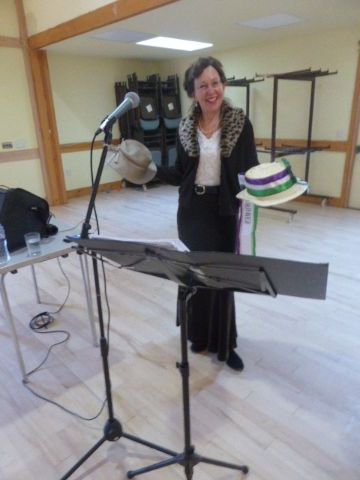Ms Katherine Collett

Progress - Downton to Deuces
The Guest Speaker for the February monthly meeting was Ms Katharine Collett who described herself as a Singer, Speaker and Entertainer and she certainly lived up to those descriptions, with the emphasis on entertainer.
Her theme, accompanied by relevant songs, was the dramatic changes in Britain from the Edwardian era up to the 1930s.
She started by expressing the view that Edwardian times represented the start of Modern Britain which we could identify with from TV series such as Downton Abbey, the Duchess of Duke Street, Upstairs, Downstairs and many others set in that era. It was a time on the threshold of change which she illustrated by singing Alexandra's Ragtime band. However, most women were confined to domestic work, representing 90% of all female workers with little chance of improvement, as heard in the song ‘I'm forever blowing bubbles’. However new inventions such as telephones were starting to introduce new working opportunities and skills whilst, for those who could afford them, items such as washing machines, electric vacuum cleaners and refrigerators were lessening domestic burdens while, at the same time, reducing the number of domestic staff required.
World War One saw more job opportunities for women as men went to war. This was particularly relevant in the factories producing munitions where the chemicals resulted in many being referred to as canaries when their skin turned yellow. The mood of the Country was reflected in the song ‘Keep the Home fires burning’. At the same time the suffragettes and others had already been campaigning for votes for women and, with the number of them working, there was an increase in the momentum for them having the vote, although the reform in 1918 only extended to older women with property and voting rights did not become more extensive for another ten years. However, as men returned from the war to find women with more aspirations there was a certain amount of domestic upheaval as portrayed in the song ‘Won't you come home Bill Bailey’. The introduction of the Welfare State, including pensions for men over 70, was some help in alleviating poverty but the song ‘Second Hand Rose’ reflected the fact that buying new items was out of the reach of many.
Yet technical developments continued. By the 1920s there were half a million telephone subscribers, whilst Marconi invented wireless communications resulting in the first radio broadcast in 1922. A song of the time that Ms Collett sang was ‘Londonderry Air’ which showed a certain nostalgia but, by now, cinemas had taken over from the old music halls and it was the start of the celebrity era. Stars such as Laurel and Hardy were able to move on to the talkies as in ‘Flying Deuces’ where they sang ‘Shine on Harvest Moon’. Ms Collett had now taken us to the 1930s and an era of more social changes where many now felt that they could improve their lives if they tried. Rapid progress had been made in the thirty years since Downton and this positive note was reflected in the final song ‘When you're Smiling’.
